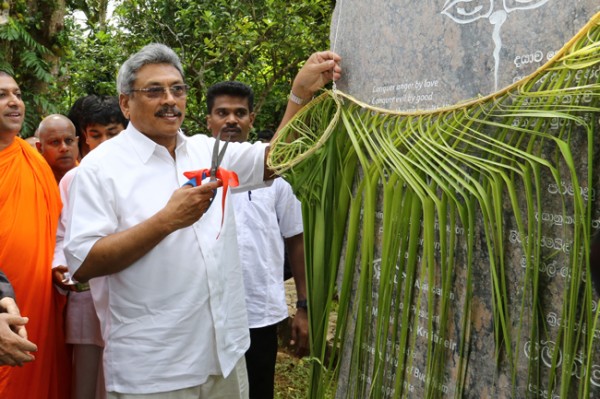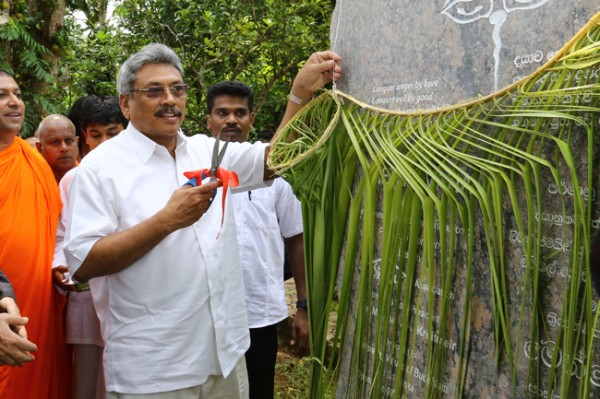
Goatabaya Rajapaksa ceremonially declaring open a Buddhist Leadership Academy of the Bodhu Bala Sena in Galle, via dbsjeyaraj.com
Sri Lanka’s fragile attempt of reconciliation, following the end of the thirty-year civil war, faces a potentially backbreaking obstacle. The growing Sinhala Buddhist nationalism that is the Bodu Bala Sena (BBS) movement is threatening to divide an already a fractious society.
On the basis of protecting Sinhalese businessmen from the rising prices allegedly caused by Muslim businesses, the BBS movement has taken to the streets targeting the Muslim community. Having started last year with the unsubstantiated accusations against Muslims for illegally building mosques on “temple land”, Buddhist priests banded together in an attempt to demolish these structures. The authorities chose to stand idly by, and when finally forced to address the issue have to still to make a firm decision.
The anti-Muslim issue has now progressed to the BBS calling for the ban of all Halal products. According to the organisation the high cost borne by manufacturers to adopt the Halal certification is being passed on to the consumers. Furthermore, the Buddhist priests from the organisation have accused Muslim businessmen of forcing Sinhalese shops out of business.
Putting aside the debate over the Halal issue, it is clear the Bodu Bala Sena is driving Sri Lanka towards a very bleak future having just emerged from a dark past.
At first glance BBS is nothing more than a minute portion of the Sinhalese population looking to create issues; in a more detailed examination the movement draws startling comparisons to the infamous rise of Nazism in 1930s Germany.
Germany had just been defeated in World War 1 and was facing serve economic pressure from rising reparation payments imposed on them by the victorious Allied nations and the global depression. Humiliated and bankrupt the people of Germany looked to blame someone for their misfortunes. This was the perfect breeding ground for the racist Nazis to rise up and lay all the blame at the feet of the German Jews.
The Nazis blamed the Jews for having gained monetarily through Germany’s defeat in the Great War, and accused them of driving the economy down while ensuring their own financial stability.
In Sri Lanka, despite having “won” the war over the LTTE, there is a sense of resentment over the growing international pressure to hold investigations in to the conduct of the military. To add insult to injury contrary to what the government claims the economy of the country continues to falter with a rapidly increasing cost of living.
The accusations which were levelled by the Nazis against the Jews are now being mirrored by the BBS and their allegations that Muslim’s are driving the Sinhalese out of business.
Between November 9 and 10 1938 was the night of Kristallnacht (or the Night of Broken Glass), an event that saw the unhindered torment of the Jewish businesses at the hands of the Nazi SA paramilitary and civilians. The authorities did not intervene, and by the end of it the streets were covered with broken glass from the windows of Jewish shops, homes and synagogues.
Sri Lanka has already experienced its own version of Kristallnacht during the 1983 anti-Tamil riots that saw nearly a thousand Tamil civilians killed while thousands more fled the country. While the Bodu Bala Sena has not yet reached this level, the attacks on Muslim businesses such as what was seen last month at the “No Limit” store in Maharagama and the vandalism of mosques around the country are ominous signs. The inaction by the authorities, and in some case the support of the organisation by members of the government, is paving the way for further racism.
Sri Lanka on a political front has much to lose from this rising anti-Muslim sentiment. International pressure continues to grow and the government has little or no answers to defend themselves with. Last year’s US sponsored resolution was labelled by the ruling regime as an attempt to isolate the country. While it was successfully passed, Sri Lanka received the support of the Muslim nations. This time around the United Nations Human Rights Council has 15 Muslim nations and Sri Lanka cannot afford to isolate itself amongst the Muslim community.
On a financial side Sri Lanka’s faltering economy is still reliant on the income earned by maids working in the Middle East. If these countries were to ban the employment of Sri Lankan maids in lieu of the attacks on Muslims, a large source of the country’s foreign income will be halted. Furthermore these continuing attacks on the Muslim community will certainly put the Sri Lankan maids already in those regions at danger of repercussions.
Sri Lankan society lost much both in the way of culture and intelligentsia with the mass exodus of Tamils during the 1980s. For a nation that prides itself on being “multi-national”, such racist sentiment will only serve to damage its future. Nationalistic ideals fuelled by racism cost the country 30 years, unfortunately 4 years on from the end of the last conflict Sri Lanka appears to be headed down the same path.
